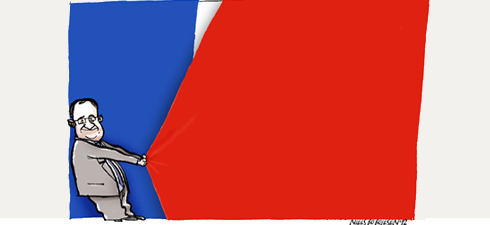If someone had said not so long ago that a character like François Hollande might embody the hopes of millions of Europeans for the beginning of a rebellion against the suffocating status quo, he would have been thought mad.
Nothing in Hollande’s bearing – an upright official or businessman – in his pragmatic and consensual character, or in his lukewarm centre-left political vision makes him a genius with panache like Cyrano de Bergerac, a historical giant like De Gaulle, or a Florentine artist of politics like Mitterrand.
And yet, as a sign of these sad and mediocre times, Hollande is now perceived across the depth and breadth of the Old World as the only Asterix possible that, from the ever indomitable village in Gaul, can rise up against the Germanic imperium of austerity and cutbacks and propose to stimulate growth and employment as the primary collective economic goal.
No French presidential election in recent memory has been on such a continental scale as this one. Berlin, Frankfurt, Brussels, Paris, London, Rome, Madrid and all the other European capitals, the so-called “markets” as well and not a few ordinary people know that what’s at stake in this election is whether the Merkozy duo, with its dogma of a balanced budget at all costs, will stay in charge, or whether the first serious attempt will be made to push the goal of expanding or reactivating job creation to the top of the European Union’s agenda.
Sick Europe has a serious tumour
It’s crucial for the countries that have seen intervention, that are being monitored and that have fallen under suspicion – Greece, Portugal, Spain, Italy, and France – and also for our very own Germany itself.
As the intellectual father of American independence, Thomas Paine, once said, there are times when common sense becomes revolutionary. This is what is happening to the moderate Hollande. He is not putting forward his proposals out of any leftist ideology, Gallic chauvinism, a desire to break the Paris-Berlin axis, or anti-European-Unionism. He is doing it to try to stop what Paul Krugman calls “European economic suicide,” which has just been made clear by the IMF.
Hollande is among those who believe there has been a serious error of diagnosis and, as a result, of treatment. Sick Europe has a serious tumour (growth and employment), but the medical team, whose most visible head is Merkel, has been treating it exclusively for just one of its problems: obesity (deficit and debt).
And, of course, the dramatic reduction in the patient’s diet has worsened the root evil, which has never been addressed. Pecuniary interests (called markets), neo-liberal ideological fundamentalism (the less government the better) and the obsessions of German book-keeping (low inflation and zero deficit) have all contributed to it.
Hollande’s insurrection
Hollande has broken the dogma. Decades back his ideas would have been considered timid, but today they seem insurrectionary. In the EU Hollande will defend two ideas that give Merkel rashes: the financial transactions tax and the creation of eurobonds.
Hollande, as Miguel Mora [El País correspondent in Paris] has written in this paper, has become “the great hope of many Europeans” who want to change history. His rebellion against Merkel’s Berlin could find more or less outright allies. And it would be rather convenient for Spain, to say nothing of Greece and Portugal.
Hollande’s insurrection might also reach into Germany, where the SPD is calling for Europe to switch its course towards growth and employment. And – note carefully – the Social Democrats may win the German elections in 2013, or win so many seats that Merkel will be forced to ask for their support to put together a coalition government.
Who knows? For now, the French voters are having their say. Paradoxically, if they choose the least charismatic man imaginable, Hollande, their decision could have a profound impact on Europe. They could, once again, make history.
From Poland
Same old French remedy
“Unlike the other Mediterranean countries, France continues to clutch at the idea that the current European crisis has been caused by globalisation, the free market, and Anglo-Saxon capitalism”,writes conservative Polish daily Rzeczpospolita. Despite all the differences between the French presidential contenders, they all share the belief that “raising taxes, selling more bonds, and fighting the Polish plumber (or Roman beggar or unemployed Tunisian) is the best way to battle the crisis”.
This, according to Rzeczpospolita, may spell trouble for Europe, especially if the victory goes to Francois Hollande, who has a completely different vision of Europe to Angela Merkel and intends to stimulate the economy with tax hikes and more public spending. His victory, Rzeczpospolita notes, could also “whet the appetites of the European left” and herald a “radical political shift [to the left] in Europe” in view of the upcoming elections in Greece and later in the Netherlands and Germany, in 2013.
Was this article useful? If so we are delighted!
It is freely available because we believe that the right to free and independent information is essential for democracy. But this right is not guaranteed forever, and independence comes at a cost. We need your support in order to continue publishing independent, multilingual news for all Europeans.
Discover our subscription offers and their exclusive benefits and become a member of our community now!












